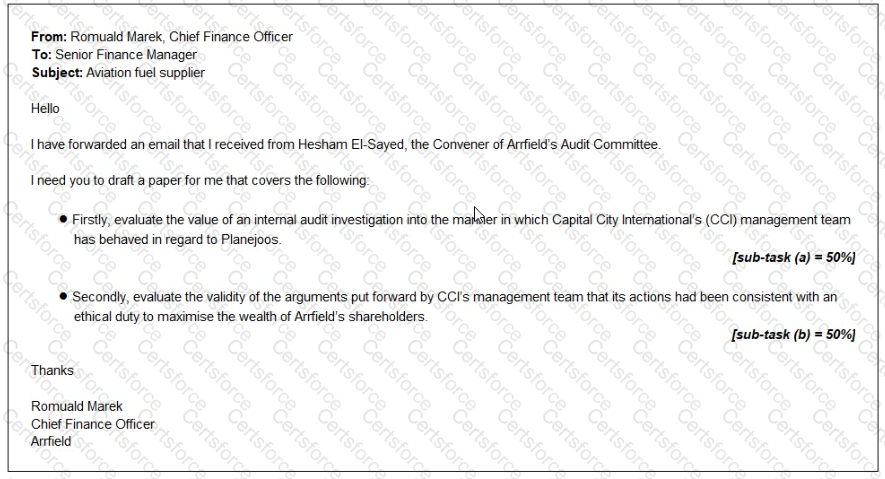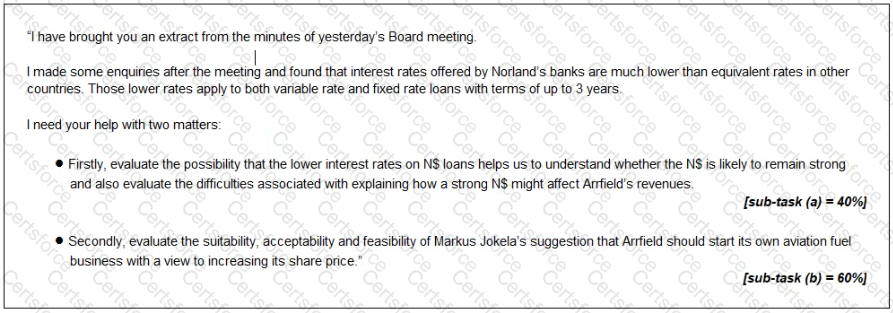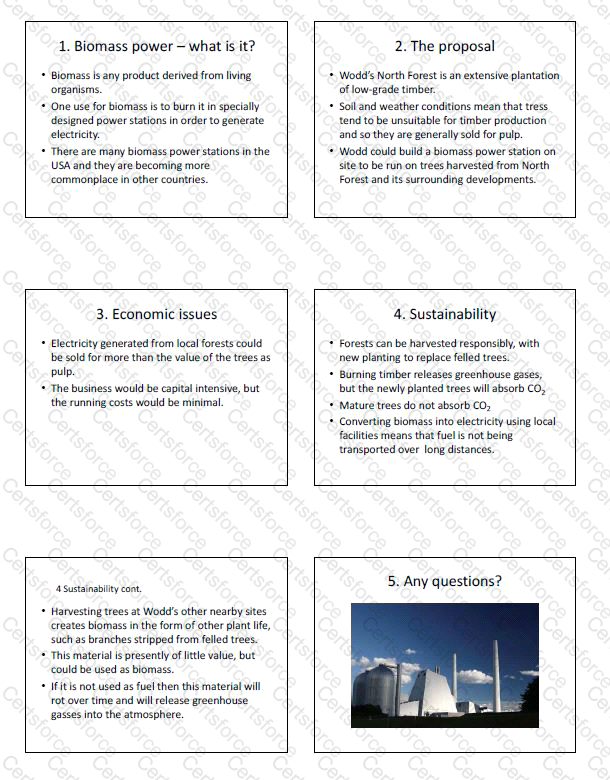
Hello
I have attached a news article
Arrfield does not set the price for aviation fuel sold at our airports, but we do receive a percentage of the revenues earned by the fuel companies.
I need your help to prepare for a Board meeting to discuss this matter Please write a paper covering the following
* Firstly, explain the impact that the criticisms voiced by the environmental campaigners will have on the frequent PESTEL analysis that Arrfield's Board conducts.
[sub-task (a) = 34%
* Secondly, evaluate the commercial logic of Arrfield's strategy of basing charges for non-aeronautical services (such as fuel sales and retail activities) on percentages of the revenues generated by the companies that operate at its airports
[sub-task (b) = 33%)
* Thirdly, recommend with reasons whether Arrfield should attempt to justify strategic decisions to its shareholders when the commercial logic of those decisions is not immediately obvious
[sub-task (c) = 33%}
Thanks
Romuald Marek
Chief Finance Officer
A month later, you receive the following email:

Reference Material:
From: Hesham El-Sayed. Independent Non-executive
Director
To: Romuald Marek. Chief Finance Officer
Subject: Collapse of fuel supplier
Hi Romuald
I am writing to give you some advance notice of an internal audit investigation that has been commissioned by the Audit Committee
Just over a year ago. Planejoos, a newly formed company, approached the management team at Airfield's Capital City International (CCI) airport and offered to take over refueling operations at Starport Planejoos offered a higher percentage of revenue than the existing supplier was paying CCI's management team agreed and appointed Planejoos rather than renew the existing supplier's contract.
CCI was unable to conduct the usual background and credit checks on Planejoos for two reasons. Firstly, Planejoos was a new company and so did not have an extensive credit history that could be checked Secondly CCI was under time pressure to reach a decision on whether to renew the existing supplier's contract or allow it to expire
CCI's management team claimed that it had acted quickly in order to benefit from the additional revenue that could be earned from dealing with Planejoos The management team was acting on the basis that it had an ethical duty to maximise the wealth of Airfield's shareholders and that maximising revenues from fuel sales through this agreement with Planejoos was consistent with that ethical duty.
Unfortunately, as a new company. Planejoos struggled to obtain trade credit and the high demand for fuel put the company's cash flows under extreme pressure Receipts from sales lagged behind payments for inventory Planejoos has now collapsed, leaving a large trade receivable that CCI will have to write off as uncollectable CCI had permitted this receivable to accumulate rather
than pressing for payment and so putting Planejoos under further pressure.
Fortunately, the previous fuel supplier was prepared to return to CCI.
Kind regards
A week later, Romuald Marek stops by your workspace and hands you a document.

The Board minute extract from Romuald can be viewed by clicking the Reference Material button above.
Reference Material
Board minutes extract: proposal to profit from ongoing strength of NS
Anna Obalowu Sole, Chief Operating Officer, reported that the strong NS was helping generate revenues from fuel sales. Discussion followed as to whether the strong N$ was likely to persist and whether a strong N$ benefits Arrfield overall.
Markus Jokela. Chief Executive Officer, stated that the Board should develop contingency plans that could be implemented if it seemed likely that the strong N$ would persist. In particular. Arrfield need not renew the contracts that permit aviation fuel suppliers to operate from its airports. Arrfield would then be free to create its own fuel sale business, buying fuel in bulk to replenish the storage tanks at each of its airports in Norland and then selling it directly to airlines He stated that this would almost certainly enhance Arrfield's share price
Romuald Marek reminded the Board that four of Arrfield's six airports are located in Norland and that those airports charge for aeronautical and non-aeronautical services in N$.
Three weeks have passed since you were informed that the relocation would definitely proceed.
You have received the following email from William Seaton, Director of Finance:
From: William Seaton, Director of Finance
To: Finance Manager
Subject: Detailed issues associated with the relocation
Hi,
Congratulations, you are now officially in charge of the transition team! I am confident that you will do an excellent job and that it will be an opportunity to enhance your career.
I realise that the transition team is expected to reduce the pressure on the Board, but I have been asked to keep an eye on things and to ensure that your team has everything that it needs. I won’t interfere, but I will stay in touch.
There are a few matters that I think you should address as a matter of urgency.
Firstly, we need to have plans in place to ensure that our information systems are ready. What changes will we have to make in order to best align the information system with the company’s needs? I am not asking about hardware issues or the physical relocation, but the changes to the information system itself.
Secondly, how might we make use of the data in our own records and external sources to ensure that the new Head Office is managed as efficiently as possible? Remember that the present Head Office is a large and complex operation in its own right and it costs a significant amount to run.
Thirdly, our relocation will create a number of challenges for our corporate treasury team. I need you to identify the key challenges and suggest how they might be dealt with.
Finally, I would like you to identify the criteria against which the success or failure of your team will be judged once the transition is complete. I need your recommendations to be relevant and measurable.
William
The following email has been forwarded to you by William Seaton, Director of Finance:
From: William Seaton, Director of Finance
To: Finance Manager
Subject: Yesterday’s Board meeting
Hi,
One of my fellow Board members made a brief presentation to the Board. I am attaching the slides that were used in this presentation.
I have to say that I thought that some of the advice being offered to the Board was incorrect, but I would rather make a positive contribution to the discussion and so I said very little.
I need you to email me your thoughts on the following:
Your views on the presentation relating to tax matters
Your views on the briefing relating to the decision making process
Your views on the briefing’s recommendations on driving performance
Finally, an alternative briefing note on driving performance. Ideally, that should be two or three headings, with a
clear explanation for each.
As usual, this is urgent. Many thanks for your help so far with this project.
William
The slides can be found by clicking on the Reference Materials button.
The formal merger with Darrell has been negotiated and the legal formalities have been completed. The two company management teams are working on the integration of the two businesses.
You receive an email from Peter Sorchi, the Chief Executive of the merged company:
From: Peter Sorchi, Chief Executive Officer
To: Senior Finance Manager
Subject: Integration of IT and treasury
Hi,
I need you to advise me on a couple of matters. The attached press clipping shows how sensitive this is.
We need to integrate the IT and treasury functions of the former Wodd and Darrell. I thought that it would be a simple matter of identifying the common ground and slimming down both companies’ departments to cover the new entity, but I have the heads of both IT and treasury from each company arguing that their approaches are better for the merged group and that they should take the lead.
Wodd’s Treasurer claims to be an expert in natural hedging of currency risks and Darrell’s argues that her department was highly successful because it makes excellent use of derivatives for hedging. Both agree only on the fact that they cannot work together. I am afraid that I have to agree with them on that and the Board will have the difficult decision of choosing between them.
I have the opposite problem with the IT function. The two Heads of IT are excited to be able to combine their databases and to develop their respective interests in Big Data. They claim that we should retain all of the professional staff in both departments and possibly even expand the merged IT Department beyond that. Given the rationalisation in all of our other functions, I do not think that we can agree to that, but I would hate to throw away a worthwhile opportunity.
Please give me your thoughts on the following:
What approach to hedging is more likely to meet our needs: natural hedging or heavy use of derivatives?
Ignoring hedging, what other factors should we consider in deciding between the two treasurers?
Are the two heads of IT likely to be correct in arguing that we need to retain all existing IT staff in order to exploit synergies in data, particularly opportunities to leverage Big Data?
What would the challenges be in motivating them to reduce their joint staffing levels and how might we deal with these?
Peter
Reference Material:

Wodd’s Chief Executive, Peter Sorchi has stopped you in the corridor:
"This weak USD is really causing us some serious problems. I think that it is only a matter of time before the stock market starts to get nervous and I am worried that our share price will fall in the near future. Thank goodness it does not appear to have fallen by much so far.
I would like to brief the Board on two main issues tomorrow. Firstly, what can we do as a Board in order to minimise the negative impact of the weak USD on our share price? Secondly, we know the identities of the key investment analysts who deal with our industry. Would it be a good idea for us to brief them? Please also consider the ethical issues arising from both of these topics as well as the more technical matters.
Please let me have a copy of your briefing notes in advance. I need to be able to sound convincing at the meeting. I’ll also have my secretary refer you to a really helpful blog."
You have received the following email from Marcus Svenson, Finance Director:
From: Marcus Svenson, Finance Director
To: Senior Finance Manager
Subject: Biomass proposal
Hi,
The Board has just heard a presentation by an engineering consultancy concerning a proposal to develop a biomass power station adjacent to our North Forest.
The Board has asked us to put together some thoughts about the merits of this proposal. We would proceed on the basis that we would build the power station and sell the resulting electricity to the national power generator which has a number of coal-fired power stations, each of which is nearing the end of its useful life and the coal has to be shipped in, so we should find it relatively easy to guarantee sales. The power generator has indicated that it would be possible to negotiate a three year contract in the first instance, with the expectation that this would be extended by subsequent three year contracts, subject to price and performance.
We would be responsible for building and operating the power plant and we would also have to pay for 50% of the cost of power lines for connecting to the national electricity grid, with the other 50% being funded by the national power generator.
Please draft a briefing paper that I can present to the Board on the following:
How can we predict whether the share price is likely to increase or decrease if we commit ourselves to this project? You should identify the challenges associated with answering that question and indicate how we might address them.
What are the long-term risks associated with future revenues from the sale of electricity? How might we manage these?
Marcus
Reference Material:

Newsweb
Protesters block bulldozers
Attempts by Wodd to harvest some of the hardwood trees from their newly acquired Bravadorian forest suffered a further setback yesterday.
Wodd’s bulldozers have been unable to make any headway in clearing the site for the company’s first logging base because environmental groups from several countries have descended on the Bravadorian jungle to protest the proposed destruction of the forest and the associated harvesting of many rare hardwood trees. Protestors have chained themselves to trees and to heavy equipment, making it impossible to commence the clearance operations.
Wodd’s problems have been compounded by the recent discovery that a tribe of forest dwellers has lived in the forest for many generations, making little or no contact with the outside world in the process. The tribe is effectively nomadic, moving from one part of the forest to another, surviving by hunting game and gathering edible vegetation and relocating when food starts to become scarce. The environmental protestors claim that Wodd’s activities will make it impossible for this tribe to continue with its traditional way of life.
Wodd claims to adhere to The Forestry Stewardship Council of Marland’s ten principles, which include the assurance that "The legal and customary rights of indigenous peoples to own, use and manage their lands, territories, and resources shall be recognized and respected."
Reference Material:

Daily Gazette
Draft story for comment
The singer, the forester and the tax adviser
Popular singer Barry Crauder is regarded as one of our more financially-aware personalities. He works hard, releasing at least one new album every year and serving as a judge on a popular talent show. He has a reputation for investing this income wisely, choosing to save for his future rather than squandering on the trappings of the show business lifestyle.
Crauder’s popularity was severely damaged when it emerged that he pays little or no tax on the investment income derived from his portfolio of investments. That is because he has used one of the few remaining tax loopholes, namely investment in forestry. He owns significant areas of forestry in the far North of Marland. We estimate his earnings from those investments to exceed M$800,000 every year and yet he has not paid a single Cent in tax on that income since he first invested in forestry ten years ago. In contrast, a typical fan who earns the national average wage of M$28,000 every year will pay approximately M$7,000 in tax.
So, could we all invest in forestry? Well, not unless we can afford it. I posed as a wealthy business entrepreneur and approached several leading tax advisers. Most were interested in helping me to invest a seven figure sum to avoid tax, but warned that saving tax could be expensive in terms of fees and commissions.
Four firms recommended forestry as the ideal investment. All recommended Wodd, with whom all four claimed to conduct "significant business". They said that a typical client would give Wodd a bank draft and leave the purchase and subsequent management to Wodd in return for a fee. Most clients had never even seen the forests that they own and none ever need to make a management decision concerning the growth or sale of timber.
Sadly, investing in forestry is a rich person’s pursuit. I was warned that companies such as Wodd are unlikely to entertain a potential client whose initial investment does not run into the tens of millions of M$.
Please address any response to Sonia Jones, care of the Daily Gazette news desk, as quickly as possible.